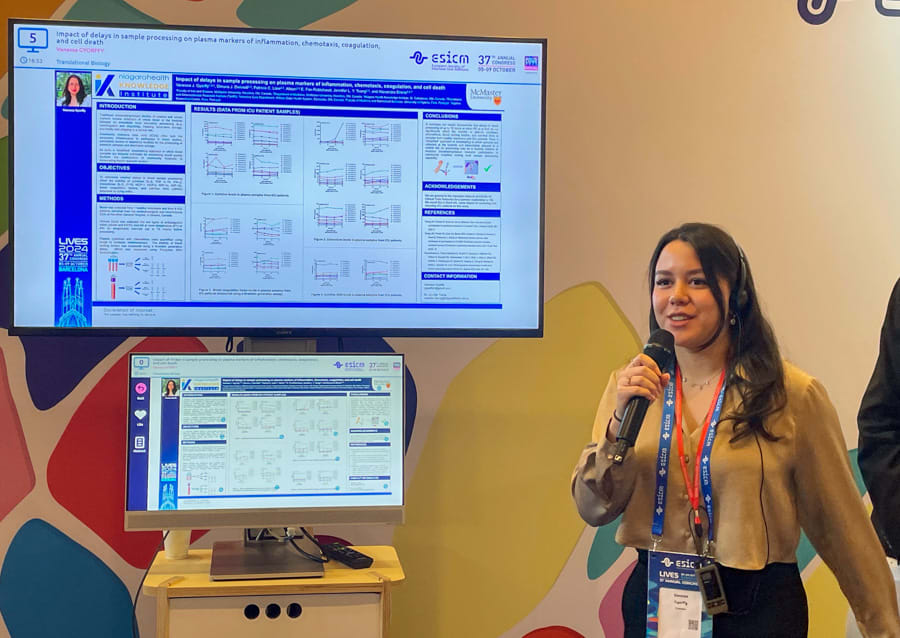The research we conduct at Niagara Health has a profound impact on the health and well-being of our patients and communities, and contributes to better understanding some of the most significant healthcare challenges of our time with the potential to benefit patients in Niagara and across Canada.

Vanessa Gyorffy presents her research findings at the annual congress of the European Society of Intensive Care Medicine in Barcelona, Spain, earlier this month. Her groundbreaking work is poised to changed how translational research is done around the world.
The Niagara Health Knowledge Institute (NHKI) is poised to transform health research worldwide with an innovative blood biomarker study whose findings could make it easier for more rural and community hospitals to contribute to translational research.
Translational research aims to translate or convert research results and discoveries into real-world applications that directly benefit people.
The study, completed by 2023 NHKI summer student Vanessa Gyorffy, found that plasma biomarkers, which are critical for diagnosing and predicting outcomes of various conditions, could remain stable for up to 72 hours, even at room temperature. That means rural and community hospitals without lab facilities to store and process blood samples can safely ship them to research institutions without worry they will deteriorate and compromise the validity of any study using them.
Previously, it was assumed that plasma would degrade and be unusable in research when not processed immediately. But this study shows that community hospitals, regardless of their location in the world, “can just collect samples and put them in a courier envelope and ship it to the sponsor site,” says Dr. Jennifer Tsang, NHKI Executive Director and Chief Scientist.
This overcomes a critical barrier that has kept smaller and remote medical centres throughout Canada and in low- and middle-income countries where resources are scarce from participating in global translational studies. It also allows for more inclusive and equitable health research that could transform standards of care for patients around the world.
This game-changing finding will be published in PLOS ONE, a peer-reviewed, biomedical and health journal, further positioning NHKI as a leader in building research capacity in non-academic hospitals.
Gyorffy, who will be first author on the paper, worked under Dr. Tsang and Dr. Alexandra Binnie, a critical care physician and intensive care unit physician lead at William Osler Health System in Toronto.
“This is significant,” says Gyorffy, a McMaster University arts and science/biology combined honours student with a passion for biomedical research. “What we've found goes beyond assisting community hospitals in Canada. It has the potential to impact health research on a global scale. We’re thrilled to share our findings, and we look forward to presenting them at international conferences.”
The study is already getting attention beyond Canada’s borders. Gyorffy presented her findings earlier this month at the annual congress of the European Society of Intensive Care Medicine in Barcelona.
In September, Dr. Tsang was invited to the Global Co-ordination, Federation and Support of Platform Trials meeting in Dublin, Ireland, where she spoke about Gyorffy’s findings in a conversation about incorporating translational research into platform trials. The meeting was organized by the World Health Organization, the Irish Critical Care Clinical Trials Network and the International Forum for Acute Care Trialists (InFACT).
All of it is a remarkable feat for Gyorffy as a young researcher, Dr. Tsang notes.
“For an undergraduate student to complete a project like this in three months, present it nationally and internationally, and get it published within a year is unprecedented,” Dr. Tsang says.

